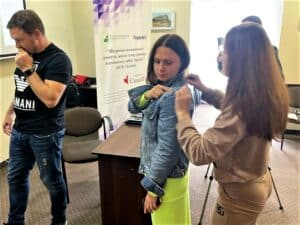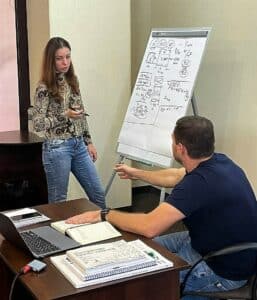War has had an ambiguous effect on changing gender roles in Ukraine. While many men have lost their jobs or joined the military, women are taking on new roles and working multiple jobs to compensate for the lost family income.
The consequences of war have disproportionately affected internally displaced persons and marginalized groups, such as female-headed households, IDPs, and people with disabilities. With the closure of schools, the high demand for volunteer work and the lack of men in economics, the burden of unpaid work that women are forced to do has increased significantly. Women and girls also report worsening access to health services, especially for survivors of gender-based violence, as well as for pregnant women and new mothers.
Women talk about the growing fear of gender-based violence and food shortages, especially in areas of heavy war. On average, men currently feel richer than women. Thus, the war had a much more negative effect on the financial situation of women, not men. War increases unemployment among the entire population, which will likely push women into the unprotected informal sectors of the economy and increase poverty. This creates tensions in the supply part of the employment market, including in the garment industry, especially for the vulnerable, e.g. displaced women.

A business planning session for the humanitarian component, September 16-18, 2022 in Dnipro
One of the solutions is to provide self-employment or help open micro businesses that can co-operate, thus providing women with workplaces. This is what the SEW Ukraine project is doing as part of its humanitarian component for women from vulnerable groups who don’t plan to move to other regions of the country and are ready to start their garment businesses.
“According to our experts, the selected ideas have significant potential. The project is trying to provide women with practical knowledge on building business processes; in marketing, legal support, and accounting – so that our beneficiaries can improve their business processes. We currently support a group of 25 women’s businesses that plan to organize their garment production. The second group of 25 applications is underway. Moreover, we are promoting and supporting cooperation between the participants. As a result, a full range of services to support these micro-businesses will be provided”, says Denys Grechko, President of the Gorenie Charity Foundation, co-implementing the SEW Ukraine.
According to the project’s needs assessment, the point of entry for women’s cooperatives is initially the production of a simple product with guaranteed sales and, after a short period – the launch of branding. Armed with this approach to building resilient microbusinesses in these challenging times, women have improved their business ideas and calculations for future use with the high-tech equipment provided by the SEW Ukraine project. For example, an advanced business planning session was conducted in Dnipro on September 16-18, 2022.

A business planning session for the humanitarian component, September 16-18, 2022 in Dnipro
“I have moderated the work of very diversified business groups: underwear, women’s clothes in the sports segment, oversize clothing, and individual tailoring. There was even an individual luxury segment that planned to produce beautiful and expensive silk dresses. We are improving these business plans in a range of segments starting from mass market to individual tailoring. Thus, participants adjust each business model, market behaviour analyses, their technological cards and tailoring technologies. We try to consider all possible challenges that our participants might encounter”, says industry expert Anton Lisyutin who moderated this event.
Many humanitarian component participants have completed the previous project activities: “I have passed a technical vocational training in Dergachi, Kharkiv oblast. At some point, I decided that I could run my own business. Business planning tasks are very interesting, with lots of new information, and sometimes challenging. We feel care, help, and support in our work and training. What am I going to make? It will be women’s underwear, i.e. sets for active women designed and made of very convenient and comfortable materials”, – says Yevheniia Kopush from Kharkiv.
The SEW Ukraine’s humanitarian component helps women in step-by-step planning of the stable growth of their businesses in the domestic market and strategize entry to foreign markets in a long-term perspective.
“As a participant in the humanitarian component, I am very grateful to the SEW Ukraine project organizers for the applied knowledge that industry experts have been collecting for years. It was presented to us concisely and clearly at the business planning session. I need this knowledge very much because I plan to start my business sewing knitted suits and bed linens. My business will help me stand on my feet, sell these products – now in Ukraine, and later at the European countries that are open to us now”, – says coop activist Maryna Andrusenko from Dnipro.